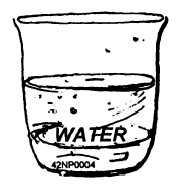| |
Figure 1-4.—Is the glass half empty or half full?
Let’s look at some specific instances in which
attitude can play a big part. Consider the situation of
PN2 Boat who works in the educational services office
aboard a carrier. PN2 Boat knows that PN3 Doe, who
works in the personnel office and is in charge of the
leave tickler, submitted canceled leave papers to the
disbursing office without authorization. PN2 Boat also
knows that PN3 Doe informed the DKs that the leave
that was supposed to have been taken by those
members was not taken, and that they should not
charge these members. Contrary to what PN3 Doe told
the disbursing office, PN2 Boat knows that the leave
was actually taken by these members. What if PN2
Boat should say to himself “Oh well, PN3 Doe does
not work for me; he is the personnel office supervisor’s
responsibility. Anyway, I’m short and really shouldn’t
care about what happens in the personnel office.” What
will happen as a result of PN2 Boat’s attitude? First of
all, the individuals who should be charged for the leave
they took will not get charged, and no disciplinary
action will be brought against PN3 Doe. Do you think
this is dereliction of duty on the part of PN2 Boat? We
think so.
Let’s consider the attitude that prompted PN2 Boat
not to take action. It is the same attitude demonstrated
by the Mess Management Specialist (MS) who
scorches the eggs; the liberty boat coxswain who
drives into every wave to create lots of spray; or the
Hospital Corpsman (HM) who loses your shot record.
PN2 Boat did not care because he had a short-timer’s
attitude and was a good friend of one of the members
who was supposed to have been charged leave. Also,
he did not care because he was not PN3 Doe’s
supervisor. As for the MS, he had already eaten. In the
case of the liberty boat coxswain, he was in this duty
section and was going no farther than fleet landing. As
for the HM, he would not end up with a sore arm from
the extra shots you might have to take. These
individuals were not interested in doing a good job.
They were just going through the mechanics of doing
a job but not taking the responsibility for doing it well.
Why are we bothering to talk about attitudes?
After all, people are people, and you cannot change
human nature. This is not true! Human nature is
constantly changing—as attitudes change. HOW do
attitudes change? First, it takes you to recognize that a
need for change in attitude is desirable. Second, you
have to do something about it or take appropriate
action to make the change. Only you can do it. No other
person can force you to change. Changing your attitude
is just like setting goals for yourself; you must combine
vision with action. It is just like wanting to do
something, determining what needs to be done, and
doing it.
No doubt you have seen a child being carried
kicking and screaming into a doctor’s office for a shot.
The child’s negative attitude is based on fear of the
immediate discomfort of getting a shot. Why do adults
go for their shots without kicking and screaming? An
adult’s positive attitude is based on the knowledge that
the immediate discomfort of a shot is insignificant
compared to the desirability of preventing disease. As
we increase our knowledge and understanding, our
outlook on life—our attitude—becomes more
positive. As a PN, you can be sure your attitude will
have an effect on your ability to deal with your
customers.
ROLE OF THE CUSTOMER
Before we talk about the role of the customer, let’s
first consider the term customer. It is a familiar word,
and all of us in the Navy are frequently considered to
be customers. We often go to other offices for
assistance. As customers, we always expect to be
provided the very best possible service. In reality, we
do not always receive the kind of service we deserve
or expect from those serving behind the counter.
Your role as a customer is to be courteous, tactful,
and respectful to the person providing assistance to
you. When you make the person assisting you feel
important, you are encouraging that person to be more
aware of the expected service he or she needs to
provide. If you feel that the person is not providing you
with the assistance you seek or expect, it is your
responsibility to bring the matter to the attention of a
more senior and knowledgeable individual, such as the
person’s supervisor. As the customer, you should
never leave an office unsatisfied. You should leave
1-9
|

